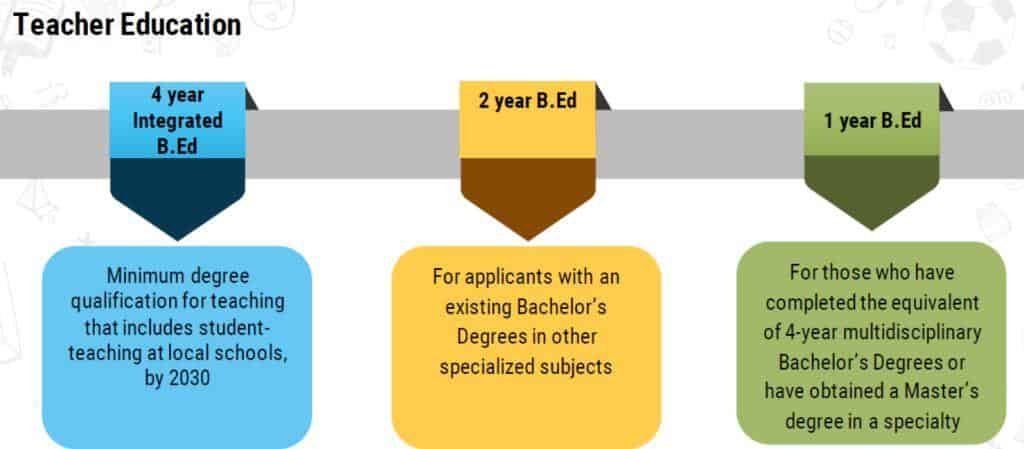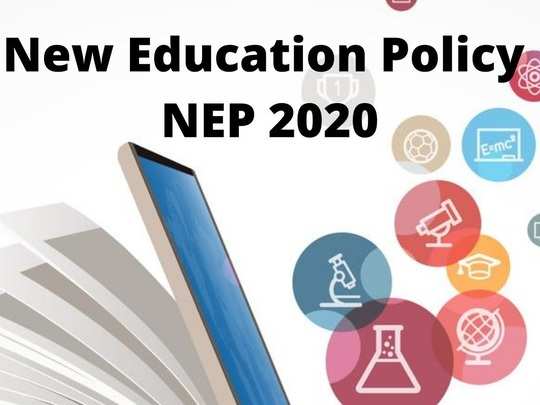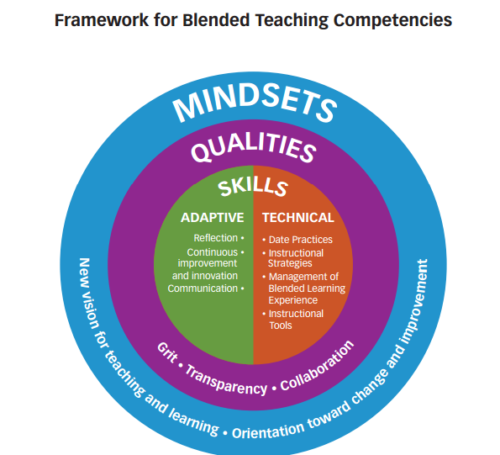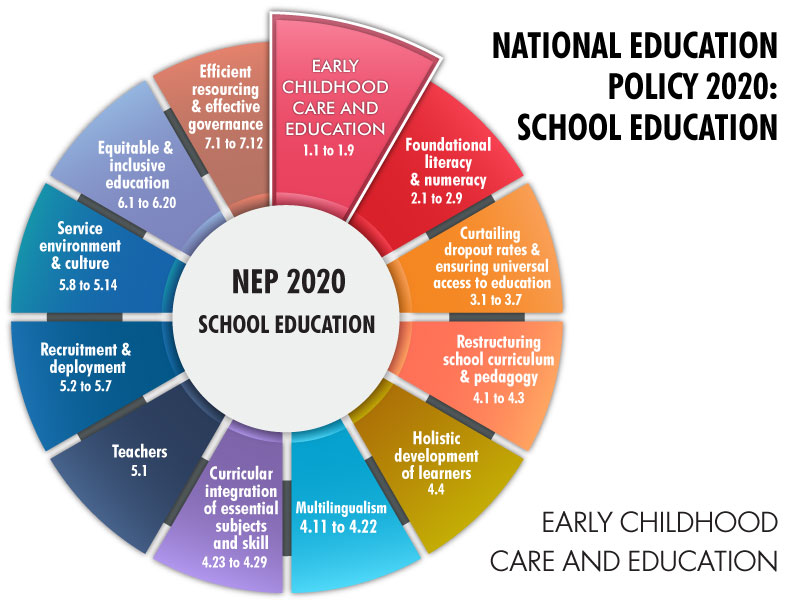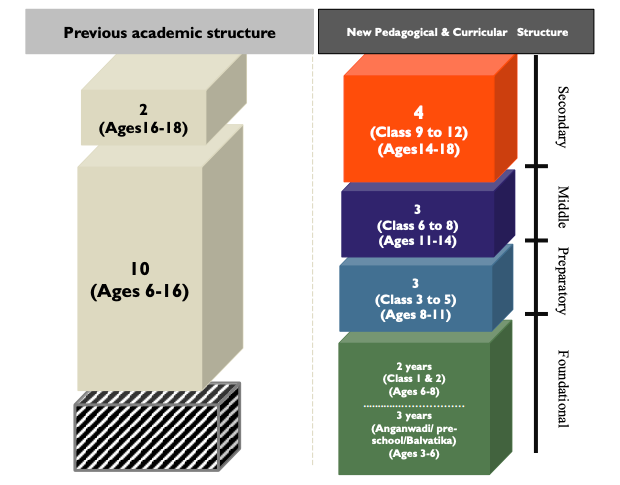Dear Teacher,
The National Education Policy wishes to place India among the best Education Systems across the world and has elucidated the vision significantly to achieve SDG 4 of the 2030 agenda for Sustainable Development.
https://www.mhrd.gov.in/sites/upload_files/mhrd/files/NEP_Final_English_0.pdf
The vision is very clear "Instill among the learners a deep-rooted pride in being Indian, not only in thought, but also in spirit, intellect, and deeds, as well as to develop knowledge, skills, values, and dispositions that support responsible commitment to human rights, sustainable development and living, and global well-being, thereby reflecting a truly global citizen".
We have studied the implications for Management and Head of school but who is actually going to realize the vision in class? It is you, "THE TEACHER" who has the pivotal role to manifest this perception.
You are our front line leader guiding all to reach the pinnacles of success.
As per NEP, in the new 5+3+3+4 structure, a strong base of Early Childhood Care and Education (ECCE) from age 3 is also included, which is aimed at promoting better overall learning, development, and well-being. In particular, the numerous rich local traditions of India developed over millennia in ECCE involving art, stories, poetry, games, songs, and more, will also be suitably incorporated.
Expectations from the Teacher
1. Beginning today, you have to readdress the current sections as Foundational, preparatory, Middle and Secondary in her everyday communications with colleagues, Heads, students and parents. All stakeholders must identify the respective grades with the corresponding sections Ex: Std. I is foundational year.
2. You have to survey the National Curricular and Pedagogical Framework for Early Childhood Care and Education (NCPFECCE) for children up to the age of 8 developed by NCERT and align her existing curriculum to note down the gaps. Accordingly she will recreate her year plans, lesson plans, teaching strategies, class assessments, activities with her colleagues/subject coordinator to achieve to prescribed learning outcomes. She will have to inform the next Head in charge of the resources required to fill in the gaps.
3. For students not reaching the learning outcomes from Sr. kg to Std. I, you enroll students for an interim 3-month play-based ‘school preparation module’ developed by NCERT and SCERTs and monitors their progress.
4. You create digital and physical resources to ensure learning is fun and use resources from Digital Infrastructure for Knowledge Sharing (DIKSHA).
As per NEP, the curricular and pedagogical structure of school education will be reconfigured to make it responsive and relevant to the developmental needs and interests of learners at different stages of their development, corresponding to the age ranges of 3-8, 8-11, 11-14, and 14-18 years, respectively.
Expectations from the teacher
1. The lesson plans at Foundational level should be flexible, multilevel, include play/activity-based learning and follow the curriculum and pedagogy of ECCE.
2. At the Preparatory Stage, lesson plans should include play, discovery, and activity-based pedagogical and curricular style of the Foundational Stage. Build solid groundwork across subjects, including reading, writing, speaking, physical education, art, languages, science, and mathematics.
3. At the Middle Stage, more of subject teachers for learning and discussion of the more abstract concepts in each subject that students will be ready for at this stage across the sciences, mathematics, arts, social sciences, and humanities with immense focus on Experiential learning in the lesson plans. [http://www.nwlink.com/~donclark/hrd/styles/kolb.html] within each subject.
4. In the Secondary Stage, more focus on multidisciplinary study, building on the subject-oriented pedagogical and curricular style of the Middle Stage, but with greater depth, greater critical thinking, greater attention to life aspirations, and greater flexibility and student choice of subjects.
As per NEP, To close the gap in achievement of learning outcomes, classroom transactions will shift, towards competency-based learning and education. The assessment tools (including assessment “as”, “of”, and “for” learning) will also be aligned with the learning outcomes, capabilities, and dispositions as specified for each subject of a given class..
Expectations from the Teacher
1.Embed Art-integrated education in classroom transactions not only for creating joyful classrooms, but also for imbibing the Indian ethos through integration of Indian art and culture in the teaching and learning process at every level. Currently Art is taught in silo, now it is part of every subject.
2. Embed in classroom transactions sports-integrated learning to help students adopt fitness as a lifelong attitude and to achieve the related life skills along with the levels of fitness as envisaged in the Fit India Movement. Study the expectations of Fit India movement and modify lesson plans to integrate sports.
3. There will be no hard separation among ‘curricular’, ‘extracurricular ’, or ‘co-curricular’, among ‘arts’, ‘humanities’, and ‘sciences’, or between ‘vocational’ or ‘academic’ streams so continue respecting the time dedicated to all the classes and ensure no co-curricular period is sacrificed for an academic period. with the syllabus reduction, there will be sufficient time.
4. The crucial question is how are you going to plan your forthcoming year plans and subject planning to include all the subjects in the timetable and do justice to the curriculum? A blended classroom approach will help to ensure students read the material before entering the physical classroom.
As per NEP, wherever possible, the medium of instruction until at least Grade 5, but preferably till Grade 8 and beyond, will be the home language/mother tongue/local language/regional language. Thereafter, the home/local language shall continue to be taught as a language wherever possible.
Expectations from the teacher
1. In both private or public schools, while teaching you can use the state or local or mother tongue to support student's concept learning. Time to brush up on your language skills.
2. In the Foundational stage, it is observed that children pick up languages extremely quickly between the ages of 2 and 8 and that multilingualism has great cognitive benefits to young students so in your lessons bring in varied language perspectives.
3. In the three - language formula, it is desired that two of three languages are native to India and in Grade 6 or 7, students can shift the language so while choosing text books, do source out bilingual books for particular subjects.
4. Enroll your students of Grades 6-8, under the ‘Ek Bharat Shrestha Bharat’ fun project/activity. This project/activity would be a joyful activity and would not involve any form of assessment.
5. Sanskrit can be offered at all levels of school and higher education as an important, enriching option for students, including as an option in the three-language formula so currently there is a lack of teachers in the field. you can pursue the classical subject for better job opportunities. also, create a stronger resume with command over classical languages like Tamil, Telugu etc. It supports as NEP stresses that all students in all schools, public or private, will have the option of learning at least two years of a classical language of India
As per NEP, Concerted curricular and pedagogical initiatives, including the introduction of contemporary subjects such as Artificial Intelligence, Design Thinking, Holistic Health, Organic Living, Environmental Education, Global Citizenship Education (GCED), etc. at relevant stages will be undertaken to develop these various important skills in students at all levels.
Expectations from the teachers
1. It is time to move out of the existing subjects and textbooks and update oneself with new subjects like AI, Design Thinking, Coding which will be integral subjects at Middle and Secondary level.
2. . A practice-based curriculum for Grades 6-8 will be appropriately designed by NCERT while framing the NCFSE 2020-21 to bring in vocational subjects so register oneself with the concerned authorities to update oneself.
3. Students will participate in a 10-day bagless period sometime during Grades 6-8 where they intern with local vocational experts such as carpenters, gardeners, potters, artists, etc. You will have to liaise with the industry experts to understand the outline of their planning and share suggestions for better learning outcome. Guidelines will need to be prepared for safety and security of the students.
4. NEP stresses on “Knowledge of India” will include knowledge from ancient India and its contributions to modern India and its successes and challenges. In every activity or event you plan like Annual Day, Debates, Quiz, include aspects of the country.
5. Value education is integral and you are already doing it but NEP stresses it further where they want students at a young age to be taught the importance of “doing what's right”, and be given a logical framework for making ethical decisions so study your syllabus to integrate SDG's and other values within the curriculum.
6. The text books will be redesigned to bring in local content and flavor so once again research the market for these textbooks.
As per NEP, the progress card of students will include self-assessment and peer assessment, and progress of the child in project-based and inquiry-based learning, quizzes, role plays, group work, portfolios, etc., along with teacher assessment. The holistic progress card will form an important link between home and school and will be accompanied by parent-teacher meetings in order to actively involve parents in their children’s holistic education and development.
Expectations from the teachers
1. Marks are no more the tool to grade students, the assessment pattern will have to include self and peer assessment.
2. Rubrics will have to be created for variety of assessments 'for learning'which includes observation, projects, activity and much more. Collect student information on their interests and potentials. to support them on more career choices.
3. More time allocated for parent - teacher interaction as feedback is on affective, cognitive and psycho-motor development.
4. Monitor the AI tracking process to study student's growth across the stages and offer remedial support.
5. Board exams at Std. X and XII will test primarily core capacities/competencies so map the curriculum from Foundational level to teach and assess students on these aspects rather than content learning so that they are acclimatized to the pattern.
6. Students will take school examinations in Grades 3, 5, and 8 which will be conducted by the appropriate authority so orient oneself with the learning outcomes expectations and design pedagogy to achieve it. Do not stress the students for the assessments but use it as a diagnostic tool to bring n remediation.
7. Follow the PARAKH (Performance Assessment, Review, and Analysis of Knowledge for Holistic Development), as a standard-setting body which will advise school boards regarding new assessment patterns and latest researches, promote collaborations between school boards.
As per NEP, there are innate talents in every student, which must be discovered, nurtured, fostered, and developed. These talents may express themselves in the form of varying interests, dispositions, and capacities.
Expectations from the teachers
1. B.Ed. programmes may allow a specialization in the education of gifted children if you wish to support gifted students.
2. Organize more Topic-centered and Project-based Clubs and Circles Language Circles, Drama Circles, Debate Circles, Sports Circles, Eco-Clubs, Health & Well-being Clubs/ Yoga Clubs and so on to encourage students to develop their talents.
3. Enroll your students in competitions and events.
As per NEP, Teachers will be given continuous opportunities for self-improvement and to learn the latest innovations and advances in their professions. These will be offered in multiple modes, including in the form of local, regional, state, national, and international workshops as well as online teacher development modules.
Expectations from teachers
1. TET[Teacher Eligibility Test] or NTA test scores in the corresponding subjects will also be taken into account for recruitment so start studying for the same.
2. Be ready to participate in at least 50 hours of CPD opportunities every year for your own professional development, driven by your own interests.
3. A robust merit-based structure of tenure, promotion, and salary structure is being developed to recognize outstanding work so be passionate and work hard.
4. It is being planned to offer career growth (in terms of tenure, promotions, salary increases, etc.) within a single school stage (i.e., Foundational, Preparatory, Middle, or Secondary) so make yourself highly proficient within that system.
5. National Professional Standards for Teachers (NPST) by the National Council for Teacher Education is developing teacher standards by 2022. It will cover expectations of the role of the teacher at different levels of expertise/stage, and the competencies required for that stage so study it once it is released for better role clarity.
6. Additional special educators are needed across the country to offer requisite support to the studnets at all levels.
As per NEP, by 2030, the minimum degree qualification for teaching will be a 4-year integrated B.Ed. degree that teaches a range of knowledge content and pedagogy and includes strong practicum training in the form of student-teaching at local schools.
Expectations from future aspiring teachers
1. If you have a Bachelor's degree, the same college offering 4 - year course will offer 2 year course.
2. If you have a 4-year multidisciplinary Bachelor ’s Degrees or who have obtained a Master’s degree in a specialty, then you can opt for a 1 year Teaching course.
3. Vocational subjects - Special shorter local teacher education programmes will also be available at BITEs, DIETs, or at school complexes themselves for eminent local persons who can be hired to teach at schools or school complexes as ‘master instructors’, for the purpose of promoting local professions, knowledge, and skills, e.g., local art, music, agriculture, business, sports, carpentry, and other vocational crafts.
4. For specialized areas of teaching for teachers with B.Ed such as the teaching of students with disabilities, or into leadership and management positions, shorter post-B.Ed. certification courses will be available.
5. A new and comprehensive National Curriculum Framework for Teacher Education, NCFTE 2021, will be formulated by the NCTE in consultation with NCERT, based on the principles of this National Education Policy 2020.
More details under Section 5 of the National Education Policy
As per NEP, to further enhance cooperation and positive synergy among schools, including between public and private schools, the twinning/pairing of one public school with one private school will be adopted across the country, so that such paired schools may meet/interact with each other, learn from each other, and also share resources, if possible. Best practices of private schools will be documented, shared, and institutionalized in public schools, and vice versa, where possible.
Expectations from Teachers
1. Start collaborating with teachers begin with local community moving on inter district to interstate to international to share best practices.
2. Start documenting the best practices at own school or schools visited and have a designated allocated time to orient other staff members in school for the same.
3. Incorporate the best practices within your own schools adapting it to suit the local community and the available resources.
4. Use the knowledge gained for assessment and accreditation purposes wherein all public and private schools will be assessed and accredited on the same criteria, benchmarks, and processes, emphasizing online and offline public disclosure and transparency.
Teachers, you have a lot at hand and the success of the new NEP rests on your shoulders. It is time we supported you with adequate resources to begin embracing and walking the path. Finally, ending with the Sanskrit Shloka, 'Be the Change'.
Thanks and regards,
Kavita Sanghvi





